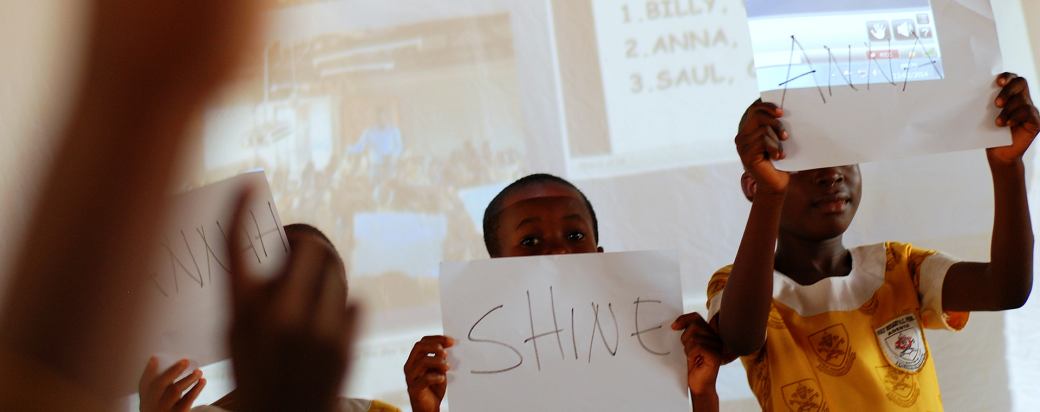
This initiative is part of the 2015-16 WISE Accelerator Cohort.
What they do
Making Ghanaian Girls Great! (or MGCubed) is Ghana’s first interactive distance-learning project, started in June 2013. MGCubed (UK’s Department for International Development Girls’ Education Challenge innovation window project, delivered by the Varkey Foundation) uses cutting edge technology and multimedia content to deliver quality teaching to over five thousand students in deprived schools in Ghana. MGCubed aims to address the challenges of teacher quality, teacher absenteeism and poor student learning. The project has equipped two classrooms in 72 Ghana Education Service Primary schools, outfitted with solar-powered computers and projectors, so that real-time two-way interactive distance learning in basic Maths and English can occur for participating students, especially focusing on young girls aged seven to 16 living in deprived communities. Every day from the two teaching studios in the capital city of Accra live lessons are broadcast to the connected classrooms for interactive learning to occur. Each classroom during term time receives one hour of English Language, one hour of Mathematics, and an hour of gender sensitive training during the Wonder Women after-school girls’ club.
Why it matters
Primary school-age girls in rural Ghana face daily barriers which prevent them learning: teachers are under-qualified and often absent; household labor keeps girls at home and early marriage or pregnancy means girls leave school. Choices and good role models in Ghana are limited. The levels of basic literacy and numeracy in primary schools are shockingly low: MGCubed’s baseline research (conducted in December 2013) gave students from all primary schools grades an international literacy test (EGRA) which assesses whether children can identify the alphabet and accurately sound letters and words out in either the local language or in English. At primary 2 level almost no children could complete these simple tasks correctly, and the highest performing students only scored 14 percent on the Letter Sound sub-task. Children have trouble demonstrating any reading comprehension of a short passage in either the local language or English.
Finally, remote rural government classrooms face several infrastructure challenges: no reliable electricity, inadequate numbers of desks and student textbooks, and no form of digital access to the wider world of educational resources available online.
Tractions so far
MGCubed’s educational goals are simple: to help all participating students achieve basic competency in reading and numeracy, as well as to raise the aspirations and school completion rates of the in-school and out-of-school girls attending their after-school girls’ club (Wonder Women).
MGCubed introduces an innovative technology package into two classrooms in each of the 72 schools in which we operate. This ICT infrastructure has been designed with several components which help overcome the specific challenges associated with operating in remote rural Ghanaian schools, namely a solar power solution to ensure reliable off-grid power, VSAT satellite dishes to ensure reliable internet connectivity, and a suite of robust dust-proof computer and audio-visual accessories to enable the students to enjoy their interactive remote lessons. The purpose of the classroom technology is primarily to allow the daily communication between the six well-trained Studio Teachers in the Accra teaching studios and all of the 142 connected classrooms. These teachers use well-structured lesson plans enhanced with digital educational content and delivered through modern teaching techniques (especially activity-based learning and phonetics, both of which are markedly absent from observed Ghanaian classrooms).
The after-school Wonder Women sessions take place four days per week. This is conducted in local language only and is a form of informal training, designed to instil further life skills for the participants and raise their self-confidence levels and aspirations to continue their education. The 30-week program covers a range of topics such as leadership, girls’ rights, sexual health, negotiating, financial literacy, and careers. A key feature of Wonder Women is the female role model guest attending every Thursday to speak to the girl students about their life choices, career pathways, and answer direct questions posed to them. This feature is designed to stretch the exposure of the girls to a range of female role models, and show them that they too can reach such heights.


